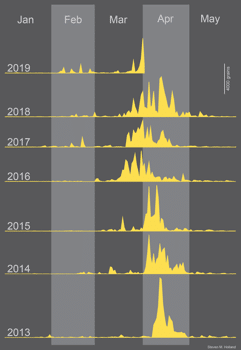Statistics show that in Georgia, as well as many other places around the world, pollen counts are beginning and peaking much earlier than previously documented years. Experts say this is likely due to climate change.
About the Data
Last spring, geologist and paleontologist Steven Holland of the University of Georgia tweeted a chart (shown below) of pollen counts over seven years, which indicated how allergy season is changing rapidly.

Holland, an allergy sufferer himself, collected pollen count data from Atlanta Allergy and Asthma.
“I realized I had like five or six or seven years’ worth of data and I could start to see that the timing of the pollen started to change from year to year,” he explained.
As shown in the chart, since 2013, both the onset of allergy season and peak pollen times have moved up a couple weeks, from early-April to mid-March for onset and mid-April to early-April for peak.
Holland is not a climatologist or allergist – in fact, he specializes in marine fossils – so he does caution that he may not have enough data to see a significant trend.
However, research from experts does corroborate Holland’s findings.
The Correlation Between Climate Change & Allergy Season
Lew Ziska, senior plant physiologist at the USDA’s Agricultural Research Service, studies the connection between climate change and allergies. In a recent paper published in The Lancet, Ziska discussed temperature and pollen trends in the northern hemisphere over several decades.
“What we’re seeing is earlier springs and later falls,” he said.
As global temperatures rise, trees begin flowering earlier in the spring and ragweed pollenates later in the fall, extending allergy season on both sides.
“There’s a clear correlation, connection, between the change in temperature, the change and the increase in the length of the allergy season and also the amount of pollen that’s being recorded,” Ziska explained.
Finding Relief for Your Allergies
Allergists suggest keeping windows closed, running the air conditioner, changing clothes and showering after being outside, and keeping bedding and carpeting clean to prevent allergy symptoms, especially during peak pollen times. A list of significant allergens for Fulton County can be found here.
To schedule an allergy test or to discuss treatment options, schedule an appointment with ENT of Georgia today.